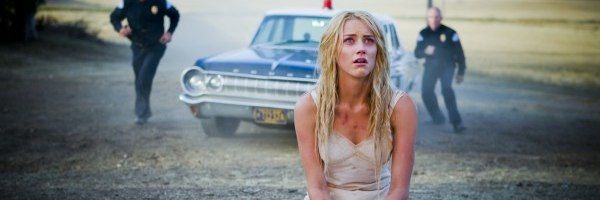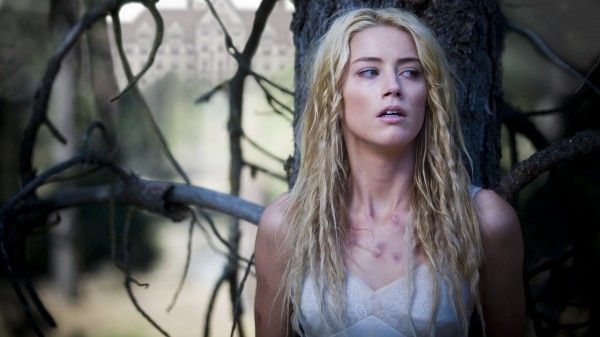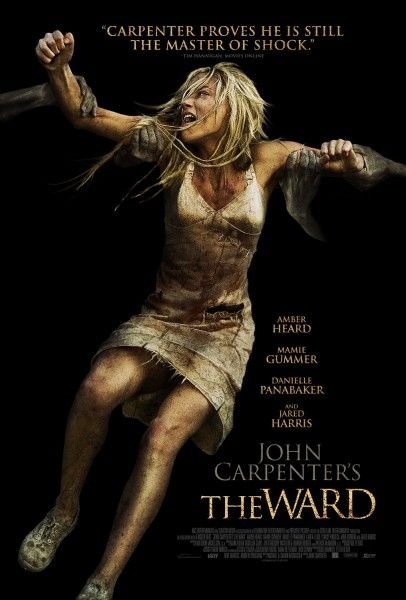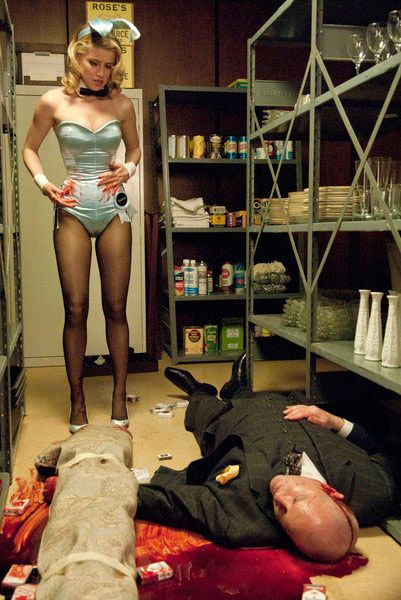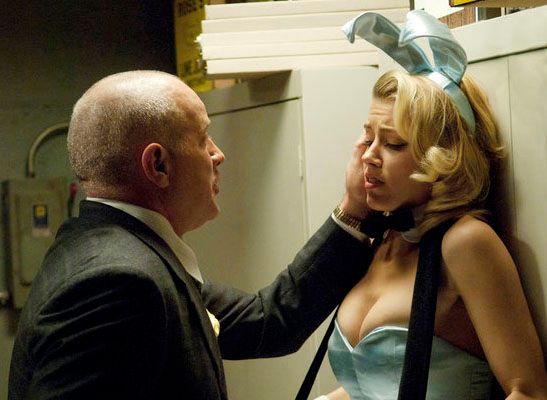Actress Amber Heard wanted to be a part of The Ward because she loves the genre, loves the director (John Carpenter) and loved the script, making it the perfect combination. And, the added attention it gets for being Carpenter’s first feature film in about 10 years doesn’t hurt either. In the horror thriller, Heard plays a disturbed young woman named Kristen, who has no memory of her life before being admitted to a mysterious mental ward. Stuck with four other equally disturbed patients, Kristen begins to see strange things and hear frightening sounds, and quickly realizes that things are not as they seem. As she struggles to regain her freedom, she uncovers a truth more horrifying than she ever could have imagined.
At the film’s press day, Amber Heard talked about what makes John Carpenter the best at what he does, how she tries to make a character as real as possible, and the challenge of being a part of a story with a twist ending. She also talked about her upcoming NBC drama series The Playboy Club, about an innocent young Bunny named Maureen (Heard) who wants to take the world by storm, but accidentally kills one of the Windy City’s most powerful mafia bosses. Check out what she had to say after the jump.
From your vantage point, what makes John Carpenter the best at what he does?
AMBER HEARD: He’s a living legend. He wasn’t working for a while, so there was a gap in his projects. And, when I heard that he was interested in making this one, I sat down with him and couldn’t believe that I was going to work with him. I’m a big horror fan. I’m a genre fan. I like to make these movies. They’re my favorite kinds of movies to make. I actually was thinking about taking a break from making genre films, until I sat down with John Carpenter, and there was the end of that break. I was honored.
Did you notice a difference in working with someone like John, and guys like Patrick Lussier and others that you’ve worked with?
HEARD: Yes, I did. Patrick Lussier (Drive Angry) is a technical director. It was about the process, the machines and the technology. It was about the 3D element, the explosions and special FX. With Mandy Lane, I felt like I was working in a different world with the director (Jonathan Levine). We weren’t working on the same project, and it worked for that movie. I mean that with respect because he did a beautiful job on that film. I just think we worked in parallel lines. I worked on making the character that I envisioned, and he didn’t give me any direction or idea, as to what he envisioned my character to be. He just let me do what I was doing and I, similarly, didn’t try to cross lines with him. We almost had no real communication during that process, which I think definitely worked for that setting. It was also his first feature. But, none of them are like working with John Carpenter. You’re really in it with John. You can’t help, but be sucked into his madness, at times, and yet, you still feel like you’re making the character that you believe in and that you want to live as. So, I felt equally protected and free.
Do you feel like The Ward hearkens back to old genre films?
HEARD: When I go into making a movie, personally, I don’t try to bring other pieces of movies with me. I think that finding a character, relating to her and making her as real as possible means forgetting all of that stuff and just trying to find the truth, in that particular character’s words. So, for me, I went to set and just tried to tell our story and tried to have fun while doing it. Luckily, I got to work with John Carpenter, who’s quite possibly the best at what he does, and I jumped into it head first.
Did you like that this film replaces some of the more grizzly scenes that have come to be expected from horror films with scares?
HEARD: There’s something nice and valuable and wonderful about the suspense and the classic horror that doesn’t just crutch on blood and the almost pornographic view of fear.
In doing something like this, with a big twist ending, did you have to be conscious of everything coming together while you were creating the performance?
HEARD: Absolutely! I’ve done movies like this before, where we have a twist ending, and you have to think about what it’s going to be like when you not only see the movie in its entirety and think back on it, but also the second time around. That’s something that’s important because I want to play this as truthfully as possible and I want it to be valid when you already know the ending and you’re watching it a second time. It’s a struggle in these types of films, but with help from John, I hope that I was able to constantly skate that line between being true to the ending, as well as being true to the mystery we were about to discover. It’s a challenge, but with a good director, you can do it.
There’s a lot of excitement for your new NBC Fall series, The Playboy Club. What did you like about the show and that era, and the whole Playboy culture?
HEARD: I love so much about the series. There’s so much texture in it. I feel like it’s a very rich platform. It’s full of all these different elements, from music and dance and performance, in a classical sense, to the crime and sex and love and social revolutions – everything that was going on, at the time. Just the music alone, in that era, is exciting and fun and different than we have today. So, I’m excited, on so many different levels, about the project. I have very high expectations of it and I hope that it’s as wonderful as I think it can be.
How is the bunny suit to wear?
HEARD: Very uncomfortable. I do not recommend it.
The Playboy Club is a reminder that, not that long ago, women were relegated to specific roles in our society. What does it take to get into that mind-set
HEARD: Well, I think this is on the eve of women’s lib, and that’s important to remember. It’s a different time now. The Playboy symbol and the name was a different thing then, than it is now. The women of Playboy were very different than the women that make up that brand now. I think there were different opportunities for women. They were relegated to entirely different positions in life. So, for me, it is very interesting to live in a world where women had this very unique, little opportunity where they actually were able to earn the kind of money that their fathers were, for a very short amount of time, in a moment in time where they actually could use that money to get an education or invest in businesses, and many of them did just that. I think it’s very interesting to think that there was this little, tiny window of opportunity where they could live on their own, spread their wings, dance, earn money and be as wild or as studious as they wanted to be. I’m having a lot of fun with that because it happens alongside some wonderful and very interesting moments in history, with the civil rights movement and women’s lib, and things that were happening congruently. I couldn’t ask for a better setting.
Have you had any conversations with women that worked in those clubs, or with Hugh Hefner?
HEARD: I haven’t spoken to Mr. Hefner about it, but I hear that he’s enthusiastic and participating, on some level. But, I did meet with Playboy Bunnies from this
particular era, and many of them are still working alongside Playboy, in more of the business part of things. It’s fascinating. When I hear the women talk about it, there’s just a lot of warmth and a lot of appreciation. I have yet to meet a woman who’s bitter about the experience. I’m sure there are some, but I have yet to meet them. I’m learning all these interesting and wonderful things about Hugh Hefner and the revolutionary spirit that he was. He was a progressive, forward-thinking envelope-pusher. I really like what he did, from integrating his workplace when he didn’t need to, to giving small loans to women, and helping them contact modeling agents, and giving them places to sleep for a discounted rate, so that they could move out of their parents’ home and support themselves. He did wonderful, very progressive, very interesting things.
Are you doing The Playboy Club to take a break from horror?
HEARD: No. I love my horror films and they will always be very close to me. I’m doing The Playboy Club because I love it. I love the pain of the corsets. No, I’m kidding. I’m just having a good time, and it’s the right project for me. It’s a very interesting character. That’s why I work on any project.
How does the sexy side of Playboy work into the show, with it being on network television?
HEARD: I don’t know. I guess that’s up to the network to decide. I’m sure that they can’t push it too far, but having filmed the pilot, I can say that it’s not very racy. I don’t know if they want me to say that, but I don’t feel like it’s that racy. Because they are a network, I’m sure that they’ll go as far as possible.

